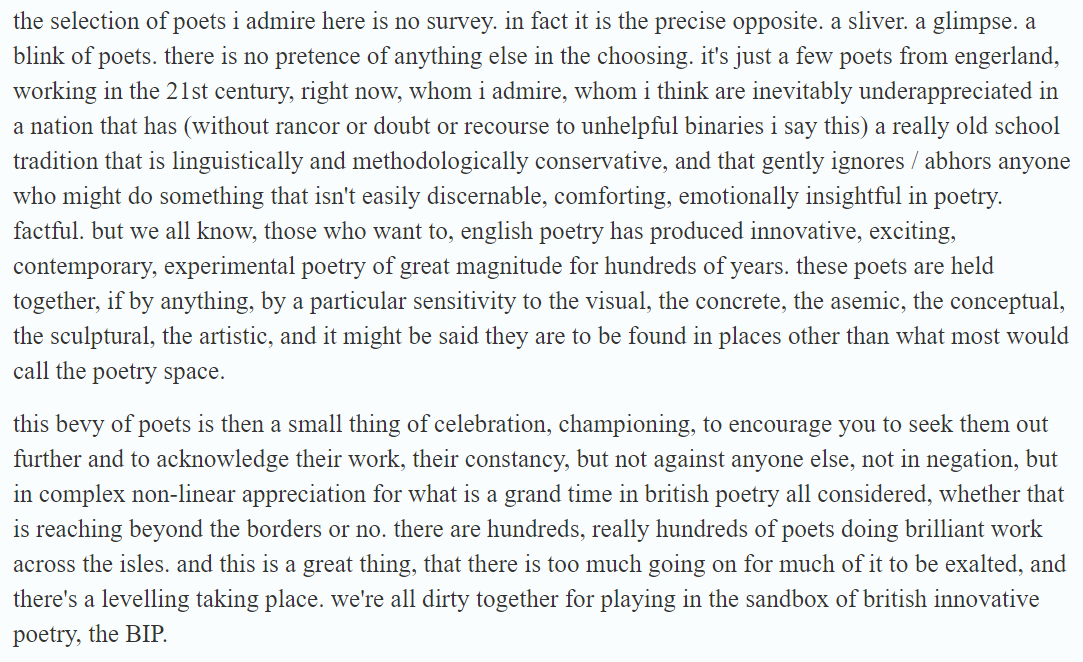
‘Enemies’ // Penned in the Margins 2013
“I imagined a man and a woman copulating and I was disgusted because their union might produce life”
As poets, that is to say, as either writers or readers of poetry, we are deeply connected to conflict; how our opinions clash, how our perceptions are distorted, how words bleed into one-another, reject eachother entirely, sit side by side as friends. We are both lovers with the text, and by extension, are at war with it as well. Moving forward from poetry as Homeric storytelling, the modern poem is a forum for debate, for contention, and for conflict: such is its place within a literary world as ‘other’, as either misunderstood, or ignored entirely by the majority. For those that do choose to embrace poetry, though, for those that learn its language, there are many ways in which it can be life-changing and more often than not, life-affirming. ‘Enemies’, a collaborative anthology of works by S.J. Fowler and ‘friends’, is a strong embodiment of the modern poem and an ideal work through which to discuss how reader, writer, and text become something altogether more than the sum of their parts.
Reading ‘Enemies’ over the past week has been an experience, not an easy one, but a deeply rewarding one. At 168 pages, there is a lot of material here to mull over, dissect and absorb, and not a single piece within this book is simple. It is impenetrable from cover to cover; Fowler does not give away his secrets easily. The opening poem here, ‘The Mechanical Root’, is narrow, cluttered; a train of thought which achieves its rhythm through shifting fragments of meaning, forcing the reader to move on restlessly picking up what they can along the way. It is both frustrating and incredibly liberating. The confusion of not understanding juxtaposed with the freedom and beauty of the word choices and turns of phrase becomes pivotal.
When reading ‘Enemies’, it becomes quickly obvious that to search for a narrative, for some shred of authorial intent, is to miss the point somewhat. As Fowler states in his eloquent introduction, ‘I hope for you, it ['Enemies'] it might take on another meaning that I cannot possibly fathom from my privileged vantage’. As a primer, the author’s words do a great deal to assure us that the collection is as much our work as his, that he would prefer us to ascribe ourselves upon it and find our own meanings within it. With this in mind ‘Enemies’ become less intimidating and something hugely immersive.
“The voice from the central tower went silent,
however, the words continued:”
For all its depth and density, for its chaotic and confusing stylistics, ‘Enemies’ is a work of great breadth, too. Fowler’s selected collaborations pull in a varied assortment of mixed media including doodles, artwork, Rorschach blots, musical scores, advertisements, YouTube links, emails, &c.,&c which both add to, and alleviate us from, the chaos. Many of the pieces which combine art and poetry revealFowler to be a master of ekphrasis, as his words push and pull against the images, painting their own pictures. As readers, we are given something physical to cling onto and an insight into Fowler’s mind first hand. It is hard to tell if these pieces were written spontaneously, almost reflexively after seeing the art, or in an altogether more meticulous and planned fashion. It could be both, but impressively, these poems explode with the energy of a first draft and shine with the coherency of having been edited many times over. In this sense, the ‘enemies’ of the book’s title, the collaborators, prove themselves to be worthy assets in charging Fowler’s writing with considerable power and insight.
It would be easy to write thousands of words about all of the ideas and themes on display here, but as Fowler so aptly states, it’s all about finding your own way through the works and also through yourself, in order to come to your own conclusions. It would simply be impossible for two people to come out of Enemieswith the same interpretation, except maybe for having the opinion that we are all its authors. I would also argue that it is impossible to love, or even like, every single piece in this collection, such is its multiplicity. You will make both enemies and friends within its pages. Perhaps its greatest strength is in its putting on a banquet for the reader, putting everything on the table and inviting you to sit down. Importantly, this is a book to own, a book to keep lying around for that moment when you want to challenge yourself, a book which you can watch change as you do.
Personally, I’m looking forward to reading ‘Enemies’ (which, to add, has been beautifully printed on glossy paper – which will certainly assist its longevity – byPenned In The Margins) in several months time, or several years time, and see how differently I approach it. For Fowler’s collection, in its writing on art, allows us both to read and write a version of ourselves.
“This book is a confusion as well as a testament, a symbol of community and accord, as well as a record I cannot fathom on re-reading”
‘Enemies’ is highly recommend for those with an open-mind and for people unafraid of innovation. As with many collections of poetry, but especially with this one, the author rejects his Virgil-esque role, refusing to hold your hand all of the way. Instead it is infinitely up to you, as a fellow artist and an equal, to get out as much as you’re willing to put in. Reading ‘Enemies’ is an experience of relationship-building at its most visceral, vital and organic, and one that cannot afford to be missed.























